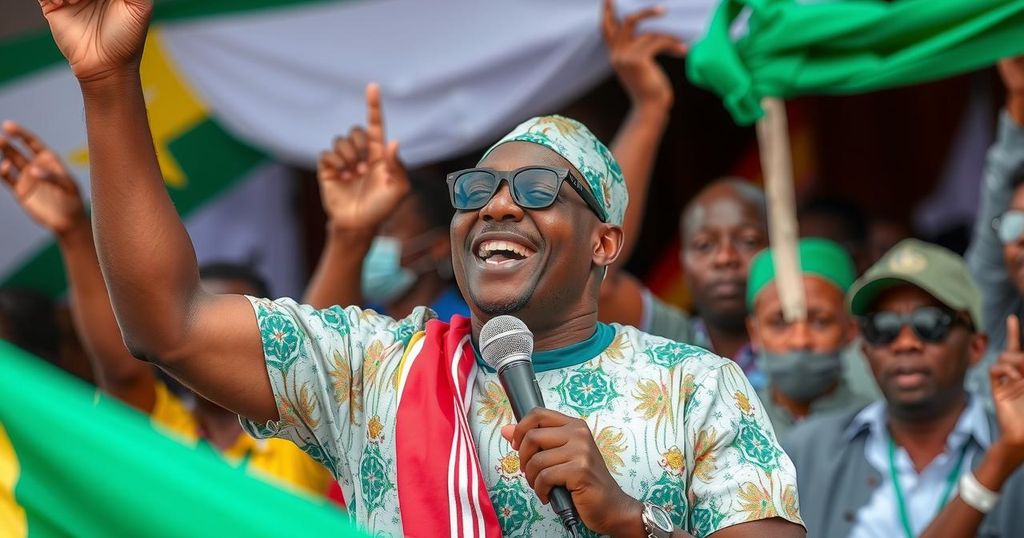The opposition party in Ghana claims its candidate, John Mahama, has won the presidential election based on provisional results. The ruling party’s candidate, Mahamudu Bawumia, faces challenges due to dissatisfaction with economic conditions. Official results are pending, with a peaceful voting process despite isolated incidents of violence. Mahama’s lead indicates potential changes in Ghana’s political landscape as the country contends with significant economic issues.
Accra (AFP) – The opposition party in Ghana has proclaimed that its candidate, John Mahama, has emerged victorious in the recent presidential election, based on provisional results. However, electoral authorities have indicated that the official results are still being compiled. The election, which took place on Saturday, was primarily contested between Mahama from the National Democratic Congress (NDC) and Mahamudu Bawumia from the ruling New Patriotic Party (NPP). The latter has attempted to dissociate himself from widespread dissatisfaction regarding government policies and the rising cost of living.
The election was overshadowed by concerns surrounding Ghana’s struggling economy, characterized by a recent debt default, currency devaluation, and high inflation, which led to a $3 billion bailout from the International Monetary Fund. Voters were selecting a new leader to succeed President Nana Akufo-Addo, who is completing his two-term limit, as well as a new parliament.
According to NDC spokesperson Sammy Gyamfi, their internal assessment indicated that Mahama secured 56.3% of the votes, whereas Bawumia received 41.3%. Gyamfi remarked, “It is very clear the people of this country have voted for change.” Meanwhile, local broadcaster ChannelOne TV reported that Mahama was leading based on 42 of the country’s 276 constituencies counted.
Despite the chaos, including two fatalities during voting incidents, the process was largely peaceful. Votes were monitored by party agents at polling stations to ensure transparency before the results are officially collated. The Deputy Commissioner of the electoral commission, Bossman Asare, confirmed that results are still in the counting phase, with official outcomes expected by Tuesday. Bawumia was also anticipated to address the media on Sunday.
In the context of Ghana’s political history, the two leading parties, NPP and NDC, have alternated power since the re-establishment of multi-party democracy in 1992. Bawumia aimed to achieve an unprecedented third consecutive term for the NPP, a goal encapsulated in their slogan “Break the 8.” However, he faced hurdles due to lingering criticism of Akufo-Addo’s economic policies, which have affected public sentiment despite recent improvements in inflation rates and macroeconomic indicators. This environment has facilitated a potential resurgence for Mahama, who previously served as president from 2012 to 2017 and has faced two unsuccessful attempts at re-election since then.
Ghana has a stable democratic history, marked by peaceful transitions of power among its two principal political parties, the National Democratic Congress (NDC) and the New Patriotic Party (NPP). The recent election was particularly critical due to the pressing economic issues the country faces, which include high inflation rates, a depreciating currency, and the repercussions of a $3 billion bailout from the International Monetary Fund. The outcome of this election is essential not only for the future direction of the nation but also as a barometer of public sentiment towards the outgoing administration’s economic strategies.
In conclusion, while preliminary results suggest that John Mahama has won Ghana’s presidential election, the official confirmation is pending. Economic challenges have been central to the electoral discourse, as the NPP struggles to rally support amidst criticism. The NDC’s assertion of victory may signify a demand for change from the electorate, reflecting the growing public discontent regarding government performance and economic management. As results are finalized, all eyes will be on the electoral commission’s announcement and Bawumia’s impending response.
Original Source: www.france24.com






